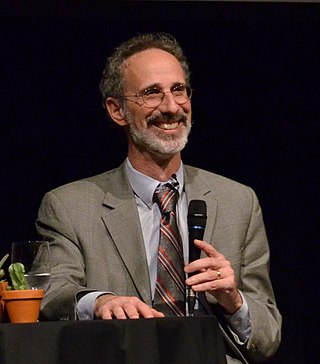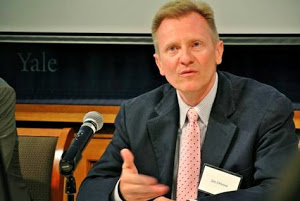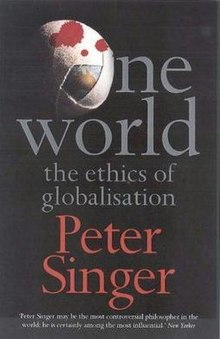Business ethics is a form of applied ethics or professional ethics, that examines ethical principles and moral or ethical problems that can arise in a business environment. It applies to all aspects of business conduct and is relevant to the conduct of individuals and entire organizations. These ethics originate from individuals, organizational statements or the legal system. These norms, values, ethical, and unethical practices are the principles that guide a business.

Peter Albert David Singer is an Australian moral philosopher who is Emeritus Ira W. DeCamp Professor of Bioethics at Princeton University. Singer's work specialises in applied ethics, approaching the subject from a secular, utilitarian perspective. He wrote the book Animal Liberation (1975), in which he argues for vegetarianism, and the essay "Famine, Affluence, and Morality", which argues the moral imperative of donating to help the poor around the world. For most of his career, he was a preference utilitarian. He revealed in The Point of View of the Universe (2014), coauthored with Katarzyna de Lazari-Radek, that he had become a hedonistic utilitarian.
Speciesism is a term used in philosophy regarding the treatment of individuals of different species. The term has several different definitions. Some specifically define speciesism as discrimination or unjustified treatment based on an individual's species membership, while others define it as differential treatment without regard to whether the treatment is justified or not. Richard D. Ryder, who coined the term, defined it as "a prejudice or attitude of bias in favour of the interests of members of one's own species and against those of members of other species". Speciesism results in the belief that humans have the right to use non-human animals in exploitative ways which is pervasive in the modern society. Studies from 2015 and 2019 suggest that people who support animal exploitation also tend to have intersectional bias that encapsulates and endorses racist, sexist, and other prejudicial views, which furthers the beliefs in human supremacy and group dominance to justify systems of inequality and oppression.

"Famine, Affluence, and Morality" is an essay written by Peter Singer in 1971 and published in Philosophy & Public Affairs in 1972. It argues that affluent persons are morally obligated to donate far more resources to humanitarian causes than is considered normal in Western cultures. The essay was inspired by the starvation of Bangladesh Liberation War refugees, and uses their situation as an example, although Singer's argument is general in scope and not limited to the example of Bangladesh. The essay is anthologized widely as an example of Western ethical thinking.
Arthur Michael Kleinman is an American psychiatrist, social anthropologist and a professor of medical anthropology, psychiatry and global health and social medicine at Harvard University.

Peter H. Gleick is an American scientist working on issues related to the environment. He works at the Pacific Institute in Oakland, California, which he co-founded in 1987. In 2003 he was awarded a MacArthur Fellowship for his work on water resources. Among the issues he has addressed are conflicts over water resources, water and climate change, development, and human health.

Global justice is an issue in political philosophy arising from the concern about unfairness. It is sometimes understood as a form of internationalism.
Alan Wolfe is an American political scientist and a sociologist on the faculty of Boston College who serves as director of the Boisi Center for Religion and American Public Life. He is also a member of the Advisory Board of the Future of American Democracy Foundation, a nonprofit, nonpartisan foundation in partnership with Yale University Press and the Yale Center for International and Area Studies, "dedicated to research and education aimed at renewing and sustaining the historic vision of American democracy".
Khaled Abou el Fadl is the Omar and Azmeralda Alfi Distinguished Professor of Law at the UCLA School of Law where he has taught courses on International Human Rights, Islamic jurisprudence, National Security Law, Law and Terrorism, Islam and Human Rights, Political Asylum, and Political Crimes and Legal Systems. He is also the founder of the Usuli Institute, a non-profit public charity dedicated to research and education to promote humanistic interpretations of Islam, as well as the Chair of the Islamic Studies Program at the University of California, Los Angeles. He has lectured on and taught Islamic law in the United States and Europe in academic and non-academic environments since approximately 1990.

James R. Otteson is an American philosopher and political economist. He is the John T. Ryan Jr. Professor of Business Ethics at the University of Notre Dame. Formerly, he was the Thomas W. Smith Presidential Chair in Business Ethics, Professor of Economics, and executive director of the Eudaimonia Institute at Wake Forest University. He is also a Senior Scholar at The Fund for American Studies in Washington, D.C., a Research Professor in the Center for the Philosophy of Freedom and in the Philosophy Department at the University of Arizona, a Visitor of Ralston College, a Research Fellow for the Independent Institute in California, a director of Ethics and Economics Education of New England, and a Senior Scholar at the Fraser Institute. He has taught previously at Yeshiva University, New York University, Georgetown University, and the University of Alabama.

Thomas Michael "Tim" Scanlon, usually cited as T. M. Scanlon, is an American philosopher. At the time of his retirement in 2016, he was the Alford Professor of Natural Religion, Moral Philosophy, and Civil Polity in Harvard University's Department of Philosophy, where he had taught since 1984. He was elected to the American Philosophical Society in 2018.

Animal rights is the philosophy according to which many or all sentient animals have moral worth independent of their utility to humans, and that their most basic interests—such as avoiding suffering—should be afforded the same consideration as similar interests of human beings. Broadly speaking, and particularly in popular discourse, the term "animal rights" is often used synonymously with "animal protection" or "animal liberation". More narrowly, "animal rights" refers to the idea that many animals have fundamental rights to be treated with respect as individuals—rights to life, liberty, and freedom from torture that may not be overridden by considerations of aggregate welfare.
Joel H. Rosenthal is a scholar, teacher, and executive best known for his work in ethics and international affairs. He is currently president of Carnegie Council for Ethics in International Affairs. He lectures frequently at universities and public venues across the United States and around the world.[1]

Daniel John Callahan was an American philosopher who played a leading role in developing the field of biomedical ethics as co-founder of The Hastings Center, the world's first bioethics research institute. He served as the Director of The Hastings Center from 1969 to 1983, president from 1984 to 1996, and president emeritus from 1996 to 2019. He was the author or editor of 47 books.
Earning to give involves deliberately pursuing a high-earning career for the purpose of donating a significant portion of earned income, typically because of a desire to do effective altruism. Advocates of earning to give contend that maximizing the amount one can donate to charity is an important consideration for individuals when deciding what career to pursue.

Mark Coeckelbergh is a Belgian philosopher of technology. He is Professor of Philosophy of Media and Technology at the Department of Philosophy of the University of Vienna and former President of the Society for Philosophy and Technology. He was previously Professor of Technology and Social Responsibility at De Montfort University in Leicester, UK, Managing Director of the 3TU Centre for Ethics and Technology, and a member of the Philosophy Department of the University of Twente. Before moving to Austria, he has lived and worked in Belgium, the UK, and the Netherlands. He is the author of several books, including Growing Moral Relations (2012), Human Being @ Risk (2013), Environmental Skill (2015), Money Machines (2015), New Romantic Cyborgs (2017), Moved by Machines (2019), the textbook Introduction to Philosophy of Technology (2019), and AI Ethics (2020). He has written many articles and is an expert in ethics of artificial intelligence. He is best known for his work in philosophy of technology and ethics of robotics and artificial intelligence (AI), he has also published in the areas of moral philosophy and environmental philosophy.

Hard Choices: Moral Dilemmas in Humanitarian Intervention is a non-fiction compilation book about humanitarianism on the international arena, edited by Jonathan Moore. Noteworthy contributors to the book include: Kofi A. Annan, Rony Brauman, Romeo A. Dallaire, Richard J. Goldstone, J. Bryan Hehir, Michael Ignatieff, Ian Martin, Elizabeth Reid, Mohamed Sahnoun, Mu Sochua, Cornelio Sommaruga, Roger Williamson, and José Zalaquett. It was published in paperback format by Rowman & Littlefield in 1998.

The predation problem or predation argument refers to the consideration of the harms experienced by animals due to predation as a moral problem, that humans may or may not have an obligation to work towards preventing. Discourse on this topic has, by and large, been held within the disciplines of animal and environmental ethics. The issue has particularly been discussed in relation to animal rights and wild animal suffering. Some critics have considered an obligation to prevent predation as untenable or absurd and have used the position as a reductio ad absurdum to reject the concept of animal rights altogether. Others have criticized any obligation implied by the animal rights position as environmentally harmful.

Wendell Wallach is a bioethicist and author focused on the ethics and governance of emerging technologies, in particular artificial intelligence and neuroscience. He is a scholar at Yale University's Interdisciplinary Center for Bioethics, a senior advisor to The Hastings Center, a Carnegie/Uehiro Senior Fellow at the Carnegie Council for Ethics in International Affairs, where he co-directs the "Artificial Intelligence Equality Initiative" with Anja Kaspersen. Wendell Wallach is also a fellow at the Center for Law and Innovation at the Sandra Day O'Connor School of Law at Arizona State University. He has written two books on the ethics of emerging technologies.: "Moral Machines: Teaching Robots Right from Wrong" (2010) and "A Dangerous Master: How to Keep Technology from Slipping Beyond Our Control" (2015). Wallach speaks eloquently about his professional, personal and spiritual journey, as well as some of the biggest conundrums facing humanity at the wake of the bio/digital revolution in this podcast published by the Carnegie Council for Ethics in International Affairs (CCEIA).












